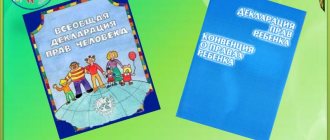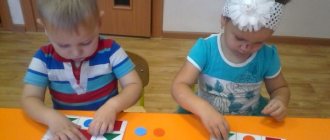Notes and presentation for the class hour “Rights and Responsibilities of the Child”; 2nd grade
Primary school teacher
MBOU "Lyceum No. 81" of Novosibirsk
Bochkar Marina Sergeevna
Goal: to introduce children to the “Constitution” of Russia, the “Convention on the Rights of the Child”, and the universal “Declaration of Human Rights”.
Objectives: to help children understand the concepts of “rights” and “responsibilities”;
generalize children's knowledge about the basic rights of the child; contribute to the development of children's motivation to use legal knowledge in life.
to form a respectful attitude towards each other, to instill in students a sense of civic responsibility
Equipment: Dictionary S.I. Ozhegova, puzzles, cards with key words, exhibition of drawings, presentation.
Progress of the lesson
1. Organizational moment.
2. Announcing the topic and setting the goal of the lesson:
Today we will try to figure out where in everyday life we exercise our rights, duties and bear responsibility.
A long time ago, thousands of years ago, people appeared on Earth. At the same time, the main questions appeared:
What can people do and what can't they do?
What are they obligated to do and what are they not obligated to do?
What are they entitled to and what are they not entitled to?
And so on.
Without a clear answer to these questions, life turned into a complete nightmare and confusion.
In the end, people managed to solve the Essential Questions, and the Universal Declaration of Human Rights was born. Over time, people realized that the child needed special protection and care.
Declaration of the Rights of the Child.
In 1959, the UN General Assembly proclaimed the Declaration of the Rights of the Child.
It argues that some human rights are directly relevant to children, who need special care and attention. Its content was a call for goodness and justice for children. However, declarations are only advisory in nature; their norms are not binding.
Another thing is the convention
; it is a treaty that must be strictly implemented by those who sign it. On November 20, 1989, the Convention on the Rights of the Child was unanimously adopted by the UN General Assembly. It is designed to create favorable conditions for the development of children.
In our state, as in any other, there is a basic law
by which we live.
- What is the name of this law?
The laws that regulate relations between the state and society are written in the Constitution
- the fundamental law of the state. (Demonstration of the book.)
3.Work in groups
— Remember what rights are guaranteed to you by the state?
4. Discussion of illustrations for fairy tales (ON SLIDES)
Many literary works, one way or another, touch upon Human rights. Let's remember these works...
5. Responsibilities. Analysis of situations. Situations play out.
Ira: Nastya, you are on duty today, please stay and wash the board and water the flowers.
Nastya: Ira, you have no right! The Convention prohibits child labor.
Who is right?
Vanya: Dima, you’re not ready for reading on Monday!
Dima: Yesterday was Sunday. I have every right to rest.
Who is right?
Conclusion. While protecting your rights, you must not forget about your responsibilities.
6. REFLECTION
- We talked about the rights, duties and responsibilities of children. I offer you situations from your life. If you answer the questions honestly, you will understand whether you are doing everything right, or whether you still need to work on yourself.
Situation 1 – You have been assigned to design a New Year’s newspaper:
a) I’ll put everything aside and get on with the paperwork b) I’ll do it when I have free time c) I’ll delegate it to another classmate
Situation 2 – You are sitting in transport. An elderly woman comes in:
a) I’ll give up my seat b) I’ll ask my neighbor to give up my seat c) I’ll turn away and look out the window
Situation 3 – You see your classmate being beaten:
a) I’ll try to protect b) I’ll ask passers-by to intervene c) I’ll pass by
Situation 4 – You found a wallet containing 100 rubles:
a) I’ll try to return it to the owner b) I’ll give it to an adult c) I’ll take it for myself
Answer a) – 5 points; b) – 3 points; c) – 0 points.
If you score between 15 and 20 points, you’re doing great! Continue to act with the same confidence. Your parents and school can be proud of you.
If from 10 to 15 points, you have something to work on.
If less than 10 points, there is nothing left to do but pull yourself together and work hard on yourself.
7. Summary
Both adults and children have rights.
But we should not forget that in addition to rights, everyone also has responsibilities to society.
When defending your rights, do not forget that other people also have the same rights as yours.
Respect other people's rights!
Basic rights of the child in Russia
Ignorance of the law does not exempt you from responsibility, and ignorance of personal rights does not exempt you from violating them. Often the rights of minor children, enshrined in the basic laws of the country, are not respected or are not fully respected.
What general rights does a child have in our country?
A minor child in the Russian Federation is entitled to the following rights:
- life and upbringing in the family;
- protection of interests;
- communication with parents and relatives;
- expressing one's own opinion;
- name and its change;
- education;
- medicine;
- property.
Rights of the child in the family
Families, as structural units of society, are protected by the state. The main provisions are fixed in the Family Code. Regulatory acts regulate family relations and protect the rights of adults and minors.
Basic family rights of a Russian child:
Children have the right to live in a family, to be raised and cared for by their parents (Article 54 of the RF IC of 1995)
Staying in a family is a significant factor in the development of an individual’s personality. A full member of society must have high moral principles. Moral standards must be instilled by parents. The decision to remove a child from the family can be approved by the court if it is in his interests, or if being with his parents threatens life and health.
Placement into care of relatives or another family is possible only with the consent of the parents, if they have parental rights to the child. In case of divorce, children over 14 years of age independently choose which parent to remain with.
The right to freely communicate with relatives and parents
Communication with blood relatives, including grandparents, brothers, sisters, helps to grow in a friendly atmosphere and cultivate family values. It is impossible to protect children from contact with relatives in the event of a quarrel, divorce, or move. If the child’s right to unhindered communication is violated, relatives can file a complaint with the guardianship authorities. If the decision is not enforced, you can go to court.
The child has the right to be protected by his parents
They are the ones who represent interests legally. Parents are obliged to act in the interests of the minor, to defend his rights in court and in everyday situations. Family law is designed to protect children from the dishonest performance of their duties by parents. If a citizen of the Russian Federation notices a violation of the rights of a child, he should contact the guardianship authorities with a complaint. The case will be reviewed by regulatory authorities.
Always take care of your children, even when you are not in the immediate vicinity! Know where your child is, what route he is taking, what he is doing and what is happening around him with the Where are My Kids app.
Social rights of the child
Children are entitled to social security. A child under 18 years of age who becomes an orphan due to the death of their breadwinners or deprivation of parental rights is transferred to another family or an orphanage to be raised. The first case involves maintaining the child at the expense of the trustee or guardian, the second - at the expense of state funding.
Minor children left without parents must be sent to institutions for the prevention of neglect (Federal Law of the Russian Federation “On the fundamentals of the system for the prevention of neglect and juvenile delinquency”, edition 04/24/2020). For preventive purposes, homeless children, vagrancy, drug use, and children who have committed offenses and criminal offenses are subject to forced detention in special institutions for preventive purposes.
According to Federal Law No. 159-FZ “On additional guarantees for social support for orphans and children left without parental care” (dated December 21, 1996), children without parents are entitled to benefits for education, medical services, and property. Social protection is carried out by government agencies and regional self-government bodies in the field of children's law.
Personal rights of a child
Personal non-property rights of children include:
Opportunity to express your opinion
The child’s wishes are taken into account when resolving issues that directly affect his interests. In judicial or administrative proceedings, the opinion of children who are ten years old is required to be heard. Verdicts against the will of the child can be accepted only in exceptional cases when the child wants something that is contrary to his interests.
Change of full name
The surname is passed on to the child from the parents. If spouses have different surnames, they choose the appropriate option at their own discretion, just like the name. Disagreements on this issue are resolved by the guardianship authority or trustee. Up to the age of 14, parents can change the surname and first name of their children with the permission of a social worker. The procedure cannot be carried out unilaterally, for example, if one parent does not agree. The following circumstances are exceptions:
- lack of parental rights;
- failure to pay child support;
- unknown location;
- inparticipation in the educational process.
From the age of 10, when changing a name, the child’s opinion must be taken into account. The guardianship authority will consider how justified and valid the reasons for the event are. The decision will be made in the interests of the minor citizen.
The change of patronymic is carried out by court decision. A weighty argument is the adoption process. The presence of a living father, whose last name is indicated on the birth certificate, will become an obstacle to a decision in favor of the adoptive person if the father has parental rights.
When a child turns 14 years old, he has the right to independently submit an application for a name change to the registry office. You can change your full name or only part of it. The document will need to explain the reason for this decision. A mandatory requirement is a written, notarized agreement of both parents (in case of a complete family).
If the parents do not agree to change the name, a child over 14 can apply to the court to resolve the issue. The document must be submitted to the registry office. Alternative legal options for a minor to change their name are emancipation (with confirmed employment and recognition of legal capacity) or marriage.
Right to freedom of religion and assembly
A child, like an adult citizen, is endowed with freedom of belief regarding God. Article 28 of the Constitution of the Russian Federation guarantees freedom in terms of choosing religion. By age, the child does not have developed critical thinking and a sufficient amount of knowledge, therefore he is easily influenced by the environment and various manipulations. Parents, educational institutions, and others are prohibited from forcing children to participate in religious gatherings against their will. Thus, the law prevents the exertion of moral and psychological pressure on minor citizens.
Property rights of children
The Civil Code regulates the rights of the child regarding the disposal of personal property (Art.,). From the age of 14, children are allowed to enter into transactions with written permission from a parent or guardian. Personal earnings and scholarships can be used at the discretion of the minor without written certification.
Children under fourteen cannot dispose of property. This right is transferred to their parents or guardians. The exception is small household purchases. The powers of parents in property transactions are regulated by the Civil Code of the Russian Federation (Article 37). The article contains a list of restrictions on the disposal of the property of a minor ward. Without the consent of the guardianship authorities, parents and guardians cannot sell, rent, or donate the child’s property.
Children have the right to use the property of their parents when living together with them by mutual consent (RF IC, Article 60).
Minor members of society are endowed with inheritance rights. A child may receive property by inheritance, will, or as a gift. Also, children are heirs of the second priority, if there are no primary heirs.
Child's rights to child support
The maintenance of the child is entrusted to the parents and other family members. If money for maintenance is not received from one or two parents, the court imposes a forcible penalty. The amount of alimony depends on the official salary and income. One child is entitled to ¼ of the income. The amount of penalties increases proportionally depending on the number of children. It is possible to reduce or increase the amount of alimony by court order.
If a parent receives money irregularly, a fixed monthly amount is established for the child's life. The funds go to the bank account of the parent or guardian with whom the child actually lives. The money received must be spent exclusively on the needs of the little citizen (Article 60 of the Family Code of the Russian Federation).
Rights of the child from birth and by age
The legal status of a child changes as they grow older. The older the little citizen, the more rights to independent actions and decisions he acquires. Let us briefly consider the gradation of children’s rights in the Russian Federation depending on age:
- 1.5 years. The child has the right to attend the nursery.
- 3 years. Children can be sent to kindergarten.
- 6 years. The child receives the right to attend school (the Constitution of the Russian Federation) and make small household purchases (office supplies, groceries). He can enter into transactions to dispose of funds provided by legal representatives, with their consent. Any transactions can also be concluded with the aim of receiving benefits free of charge, which do not require notarized confirmation.
- 8 years. Children can participate in public associations (Federal Law No. 82-FZ “On Public Associations” dated May 19, 1995).
- 10 years. The right to express an opinion appears, which may affect the change of name, place of residence with one of the parents, or adoption.
- 14 years old. At this age, the list of rights increases significantly. Upon turning fourteen years old, a child has the right to change citizenship, cancel adoption, dispose of personal earnings at his own discretion without parental consent, and bear responsibility for transactions made. You can independently dispose of the results of intellectual activity and protect your personal interests in court. You can work part-time after school.
- 15 years. A teenager can get a job and make decisions about medical interventions.
- 16 years. If there is a good reason, you can get married. This will require permission from local authorities. At the age of sixteen, teenagers can become members of cooperatives.
- 18 years. Young people are becoming adults.







